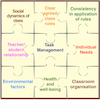Helping all children become happy learners
Individual Needs
Introduction
As teachers we do our best to meet the individual needs of all our students. However, this is limited in two significant ways. Firstly, there is only so much that can be done to differentiate and personalise the curriculum with the time and resources available to us. Secondly, there is a limit to how much understanding of each student's needs we have. At best, it may be incomplete, at worse, we may be totally unaware of a significant learning, behavioural or socio-emotional need.
Identifying the needs of students
The above diagram shows how, as teachers, if we rely only on our own perceptions and knowledge to assess a student's needs that we may miss out on the whole picture. Talking to colleagues, parents and the student can all help to clarify any needs.
It is particularly important when dealing with students with challenging behaviours that we don't overlook any unmet learning, sensory or social needs:
ADHD
Students with ADHD often have poor working memory and this can significantly affect their ability to remember instructions and explanations and manage complex learning tasks. Without additional scaffolding these students often experience task failure and this inability to continue with their work leads to low level distracting behaviours. If their learning is not supported and the focus of adult intervention is purely on behaviour management then ultimately many ADHD students become disillusioned with academic study. A vicious circle of negative comments, low self-esteem and embarrassment and resentment over task failures can lead some ADHD students to become more disruptive in class. See articles on ADHD and ADHD Girls.
ASD
Students with a diagnosis of Autistic Spectrum Disorder vary enormously in their needs and generalising is therefore unhelpful. However, it can be stated that most experience difficulties which affect their learning behaviour. For example, some ASD students have difficulty switching their attention from one topic to another and can become distressed or angry when transitions are forced on them. Some may experience difficulties with social skills that create difficulties with peers and lesson tasks that involve cooperation and sharing with others. Some will have difficulty accepting alternative ways of doing things or changes to planned routines. ASD can also make generalising difficult and so these students often need explicit teaching of how a piece of knowledge or a skill can be applied in different contexts. Adapting practice to anticipate needs and helping ASD students to emotional regulate is essential in order to reduce the incidence of challenging behaviour in the classroom. See articles on ASD and ASD Girls.
Attachment Difficulties
Students who display challenging behaviour as a result of attachment difficulties are also likely to have delay in their learning. This is particularly so for students who present with disorganised attachment style. These challenging students often reject learning because it threatens their 'omnipotent self'. They cannot fail if they do not try. Some will provoke arguments to avoid learning situations. These students often crave all forms of attention including negative interactions. Behaviour management of students with disorganised attachment style can be very difficult. Normal sanctions often have little impact on their willingness to comply and cooperate. Supporting these students requires extreme patience and an adapted curriculum where learning success is all but guaranteed. This is achieved by constantly revisiting learning that has been mastered and incrementally moving it forward. These students often crave all forms of attention including negative interactions. It is important to use constant praise and short-term reward systems to motivate and sate their attentional needs. See article on Attachment Theory.
Other Behavioural Needs
Not all students who present will challenging behaviour have a behavioural diagnosis. Some students may present with behaviours that are a concern only occassional or mildly and do not warrant a 'label'. For some students with more chronic behavioural needs there can be barriers to seeking a confirmed diagnosis. Parents may be unwilling to accept their child's difficulties and refuse involvement of outside agencies. Cultural values may prevent some communities from seeking formal diagnoses. There can be a lack of opportunity for diagnosis or uncertainty about the 'correct' diagnosis to seek.
Where there is no diagnosis it is still useful to identify particular behavioural traits and use appropriate strategies to address the student's needs. For example using strategies to support students with ADHD, ASD or PDA can be helpful.

Advertisement



